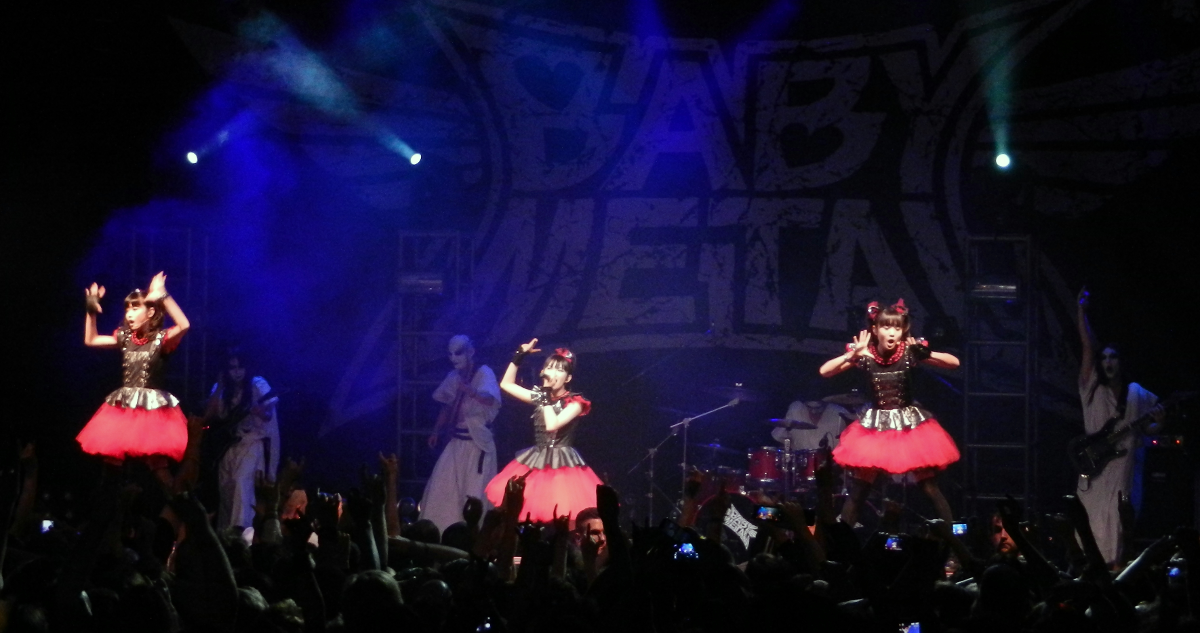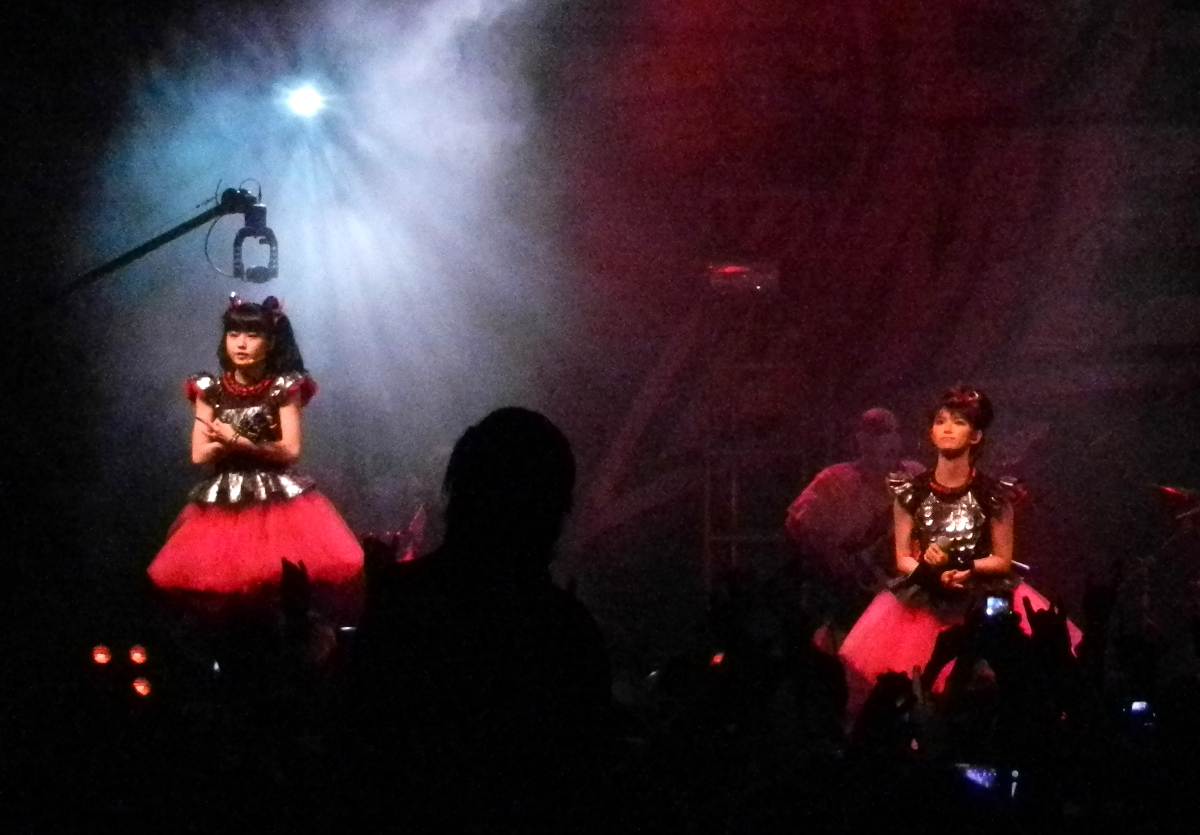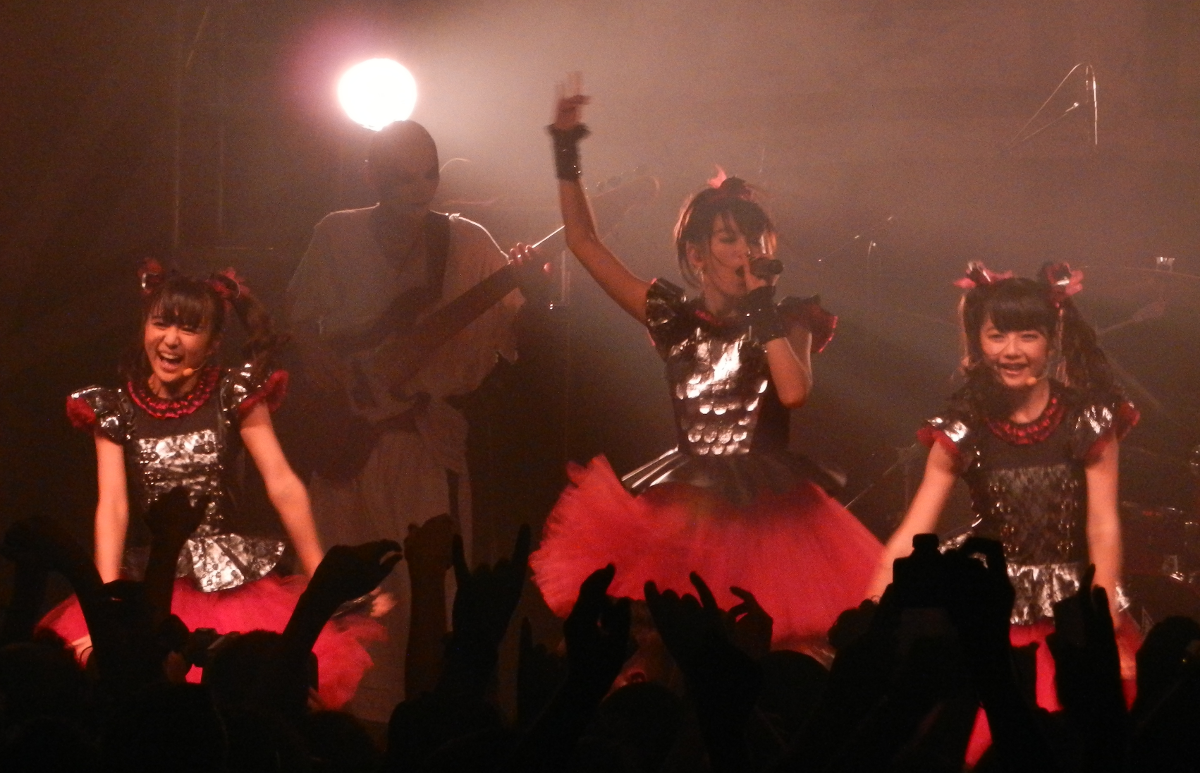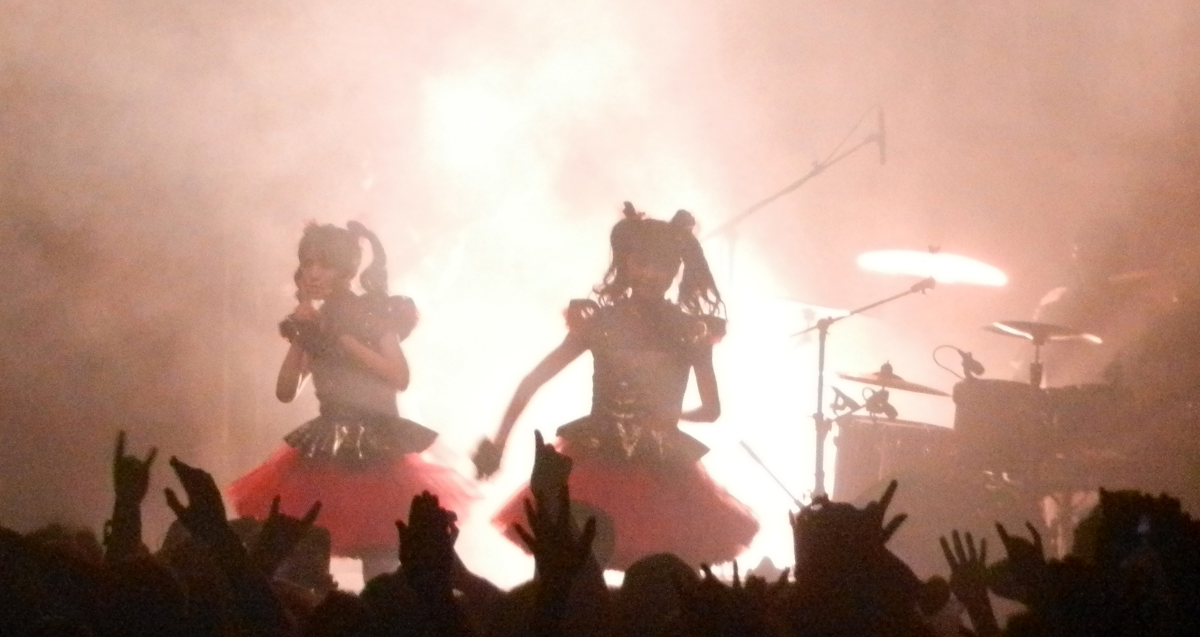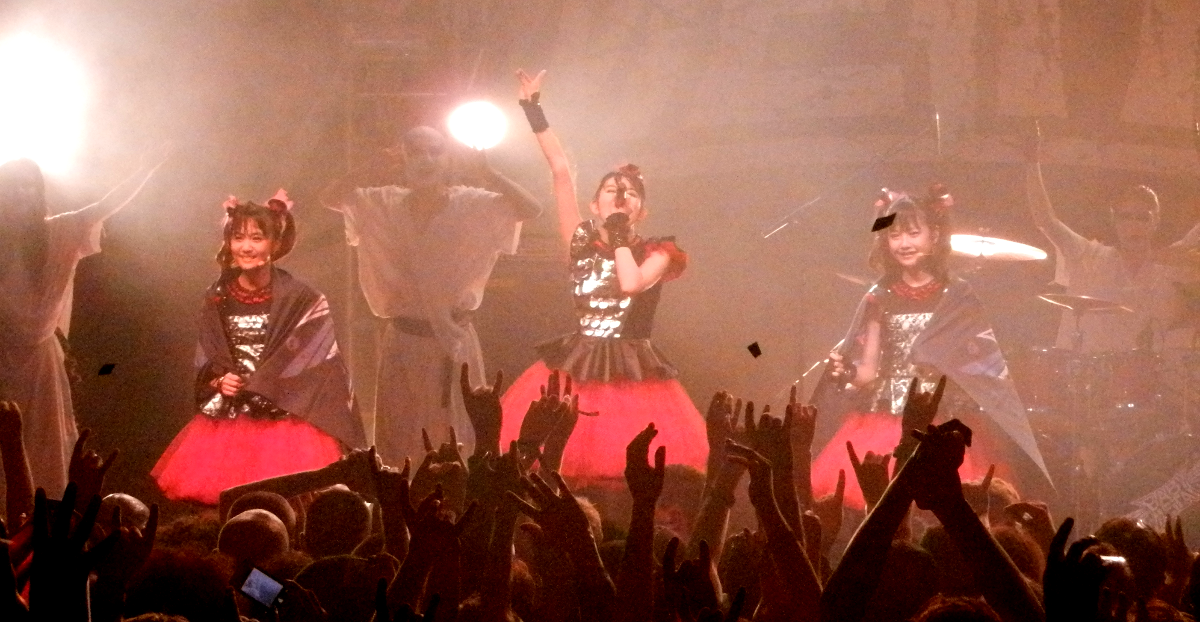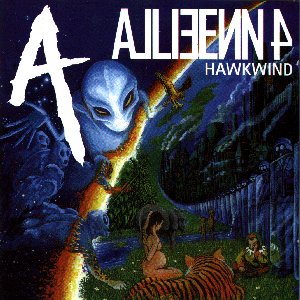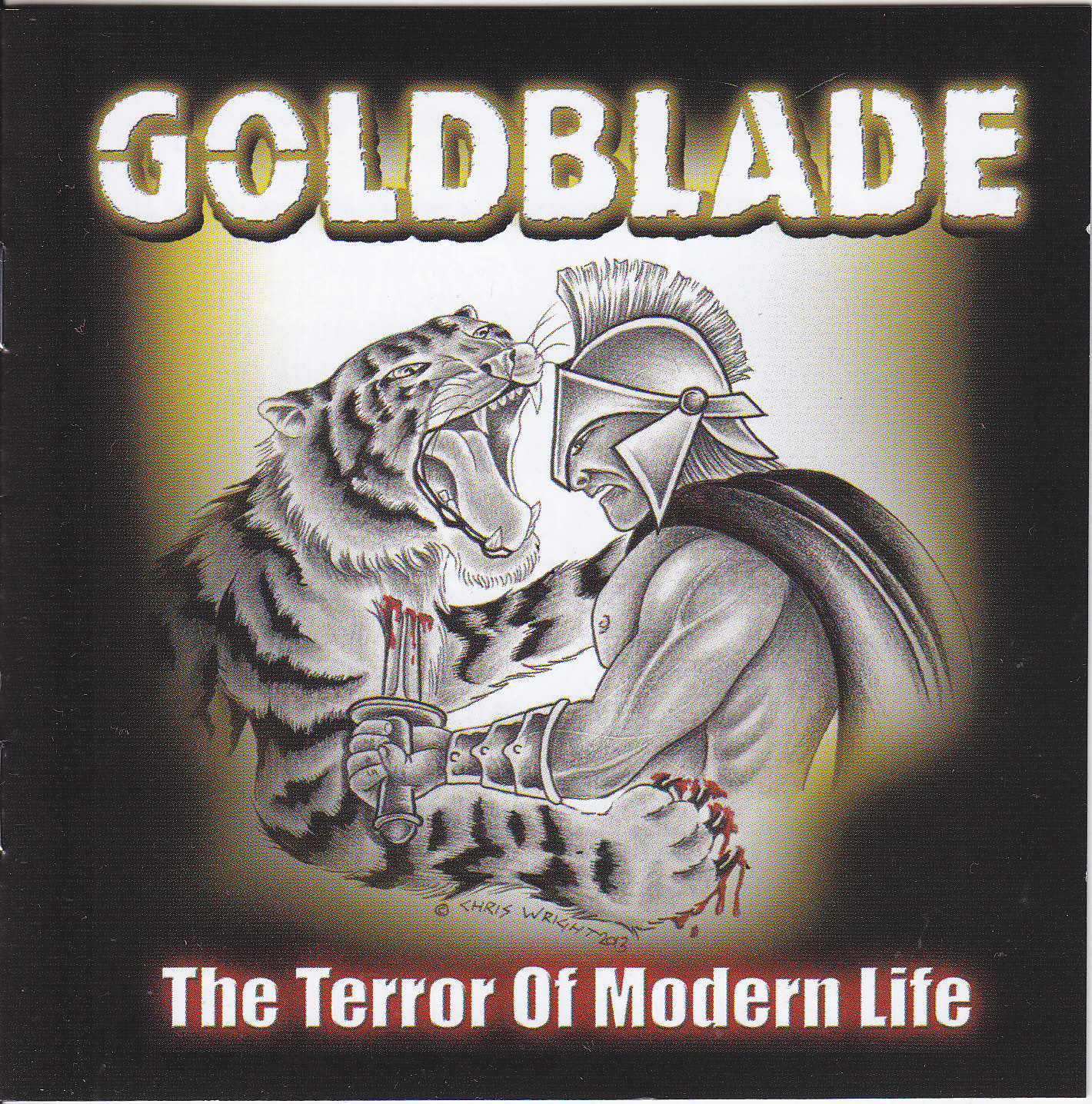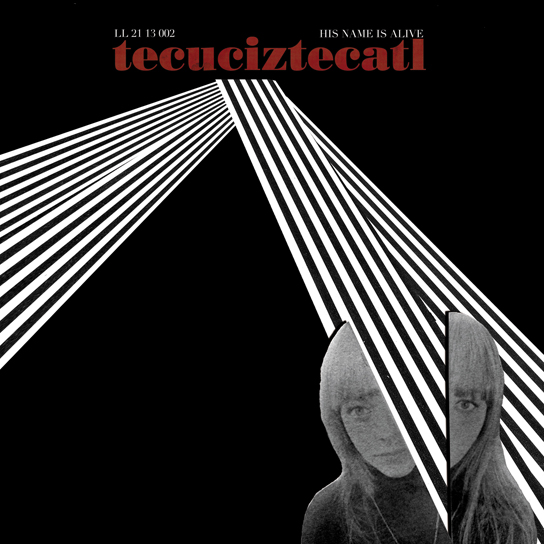London
7 July 2014
Kev Nickells went to see Japanese kawaii-rockers Babymetal live in London, and loved it. Barnabas Y, however, offers a riposte to the popularity of the genre-bending phenomenon. Pictures by James Sting.
The review
You should probably be aware of Babymetal by now. I first came across them when “the hard man of Harsh Noise Wall” Clive Henry put a link up to it. It ticked quite a few boxes for me — stylised in a way that didn’t quite make sense and seeming to be the axis of two very imagey genres – metal and J-pop. Now, I know the average metal purist will tend towards saying that metal doesn’t have anything to do with image but they are a dick who has no idea how ridiculous a Flying V looks. There’s a good reason that high street fashion and corporate graphic designers picked up on the likes of Slayer, Motörhead and Mayhem sleeves – and that’s because metal has ALWAYS been a hyper-stylised genre. It’s amnesiac at best to neglect that grunge (read in a clothes sense) was precisely about rejecting to how absurd (mainstream) metal was at that point.
Anyway.
A couple of points seem often made with Babymetal — either it’s conceptually perfect or it’s entirely incongruous. J-pop with metal arrangements. Now, I have the problem that I’m really not that familiar with J-pop — I have infrequent flirtations with it but mostly it fails to hit home with me. I have almost the inverse problem with metal — I’ve very well aware of it and I’ve long since given up on not thinking it is, overwhelmingly, tripe. Or at the very least invidiously sexist. So the conceptual perfection of Babymetal is they resonate with all the bits of metal I like — the bits that sound a bit like Iron Maiden, the really grinding riffs — but get rid of the dreadful singing. So that’s perfect music, in my book — something utterly and entirely from the core of proper pop but pushing to sanitise those bits of music that, realistically speaking, haven’t been anything like radical since the early ’90s (at the very, very latest).
This is meant to be a live review but it’s very tricky to know how to place it. They came, they did pretty much exactly what I was expecting, they left. There were subtle costume changes. Su-metal (possibly the only person with the mic on) is a smidge young to be pushing her vocals the way she is (if we want to get proper vocals about stuff). The backing band do solos and it’s boring because solos are always boring (insert jazz caveat) but lets Su-, Moa- and Yui-metal have a break. The crowd are mixed — dyed-in-the-wool metallers, vaguely internet people, J-pop faithful, linkbait intrigued and knobs like me. I spoke to a young woman who was going for a heart transplant not long after the gig and had dispensation from her surgeon/mother to come to the gig. Which is hardcore as fuck and if she’s reading, I hope it went well and you are hardcore as fuck. Probably the most mixed gig I’ve been to for a while, crowd-wise. Also — and worryingly for me — two or three rows from the front, it seems it’s only me and the mugs in my party who don’t know EVERY WORD to EVERY SONG in spite of very clearly not being Japanese. Which means that either Babymetal have acquired a seriously obsessive crowd or everyone’s been learning Japanese behind my back.But just back to the concept stuff for a second — a bit of novelty can go a small way but I’ve found it pretty astonishing how there’s a “get” to Babymetal. I have a few mates who I’d consider “proper” metal. As in, the sort of people who don’t get anything that doesn’t involve some ugly munt with a beard playing the most boring music imaginable. Y’know, properly sexless turds. Who seem to think that Babymetal are, in some sense, legitimately metal. Which is encouraging. And from where I am, it’s proper pop — for all of the mild incongruity of genre-melting, it’s much more exciting than (say) crabcore or nightcore (I tried with both, neither get further than “yeah, alright – nice idea, let’s work on it yeah?”). Babymetal have Bacharach melodies coming out of early-Slayer verses (“Gimme Chocolate”‘s chorus) which is, quite frankly, the best thing that’s happened to humanity since lie-ins. Metal uses pentatonics; so does “Gagaku” — so when the middle eight/breakdown of “Megitsune” uses both (seguing into a FUCKING EUROHOUSE bit), it’s just… congruous. And that’s a thing that pop, when it’s actually good, does amazingly — ridding the in of incongruous. You will, of course, remember that moment when Girls Aloud‘s “Biology” stopped being WHAT THE ACTUAL FUCK and you realise it was the best song ever? Babymetal do that, a bit. Or just fucking rock.
Yeah, the gig. The crowd was super-into it. The band were tight as fuck. Su-metal was actually singing. They were the best band. They played for a LONG time and they were the best band in the world. For a bit. Then a couple of days later I remembered everything else I think is the best band in the world but the important thing is that the theatre — which I largely couldn’t see because I was dancing like a teenager and sweating my very soul off — was fucking incredible. Babymetal are fucking incredible. And just to be entirely clear on the politics of things — they are a manufactured band. And while manufactured often means horseshit, it’s also worth remembering that if you want a car to get you ten miles down the road, a sensitive singer-songwriter will draw you an awful picture of a horse while a team of engineers will make you something that not just moves but is actually, in some senses, elegant. Music’s an art-form and all that, but the right idea and the right people can produce utterly outstanding music. Yes. Babymetal were utterly outstanding. Yes.-Kev Nickells-
The riposte
Why do you like Babymetal?
Obviously, I can’t tell you this for sure. Anything I tell you along those lines will be fiercely contested even if true, because nobody likes to be told. However what I can do is attempt to use analysis to show you reasons why you shouldn’t like them. After squeezing a few Babymetal tunes through my Googlemusicananalytics software (everybody seems to trust Google without question nowadays, so that’s what I’m claiming) I can reveal a few pretty fucking obvious things.
Due to the repetitive nature of the tonal/melodic content, Googleanalytics (sic) puts Babymetal firmly into the pop genre. ie, if you repeat a melody that’s less than four bars long four times or more with no variation, over a chord sequence that changes with each bar (or more), that’s pop music, baby. At this stage there’s no difference between Babymetal and Coldplay at their worst, or indeed any trance-dance-singalong on t’Radio One currently. To back this up, there’s the long-play lack of development: as in, after that four bar melody is sung four times straight with no variation, it pops (sic!) back up again less than a minute later, with an Even Further lack of variation. Don’t get me wrong — not all pop music is this shite. You don’t have to have a complete lack of development in your music for it to be pop. But if it does, it is. That’s one of the giveaways*.There’s another recent development within pop which (I think) actually is shared with metal anyway; even if it’s grown out of dance (in the case of pop). This is the breakdown, bastard cousin of the middle eight, the incestuous offspring of which is the beatdown. In modern pop, it can be called any of these things, and currently, might consist of a rhythmic (not melodic or neccessarily chordic) half-time, which is blasted into like it’s a catharsis, and/or a stripping down of parts, either by indirect means (EQ roll; ADSR [dance]) or direct means (removing instruments from the arrangement/unison of instruments [metal/other]). It more often than not contains a) some developed notes (ie, cathartic cadence or key change) or b) completely the same notes (pop). You can hear this in Lady Gaga, Arctic Monkeys, that French dance band who wear masks and claim to be technologically dexterous without using electronics — The Prodigy — which is strange, because some of the definitions I’ve thrown up just there (sweetcorn chunks) definitely sounds a bit metal. But in metal, the term is always beatdown — the major addition of definition being, my favourite: syncopation.
OK, so lets look at the metal part of the baby. Lets face it, you can recognise a music style or genre by it’s stereotype acknowledgement; by its trope manipulation. There are a hell of a lot of tropes per music genre: some of them cross over, some are ethereal, some really fucking obvious and practically jokes; it’s the combination of various musical tropes that create a genre or a nod to a genre. Some are sound types; some are structural approaches; some are scale- or key-based; some are rhythmic styles. The basic ones for metal include: distortion/distorted guitars (but other musics use distorted guitars too! I hear you dribbly scream. Read back two sentences, yo.); speed and inner-speed rhythms (shredding to you or I, on string or skin); syncopation and straight-aheadedness in opposition; shouty/screamy voices; multi-key pentatonic tonality; cut-and-shunt structural manipulation; there’s lots more. A big one is an obsession with cultural references to death, pain, putrification, etcetera, which manifests itself in black clothing with skulls on and lyrics about syphilis (as an example) — in extreme cases, however, death and cannibalisation may occur. Another big one is development and variation — (the non-Papa Roach-pop versions of) hardcore, death, black, and math metal regularly take a snippet of the end of the last riff and extrude it, refine it, show it through a different lens (syncopation) as the next riff (this is one of my favourite things about metal, by the way).So Babymetal have: distorted guitars; speed and inner speed (shredding and beatdowns); they wear black n stuff; and they very nearly trick us into thinking they use multi-key pentatonics, whereas actually they tend to work in only one or at a push two supporting keys, and fake pentatonics by skipping lots of the notes in the scale until it gets to the chorus (where they pop [sic] back out into roots, 4th, and yawn 5ths, usually in that order). They certainly appear to do beatdowns, anyway. However, they do these without syncopation, which is actually a prerequisite for any one else’s beatdowns. So its possibly not really a beatdown. Cheeky. How do they get away with it? By hitting the shallowest end of several other of the main tropes of metal, they’ve made our minds fill in the gaps; simultaneously, they’ve replaced some musical-content tropes with the wearing black, the distortion — mushing a load of recognizable moves together like a jigsaw puzzle made from three sets of pieces. It is still a jigsaw.
They also don’t sing about death or scabs or venereal disease — but about chocolate. This is probably post-ironic, I hear you say, and therefore acceptable. Wait for the end of this article. That example (chocolate) also has the added bonus of making you think about cute Japanese girls eating chocolate. Manipulated MUCH?!So what do we know about Japanese music culture? We know they’re steeped in beautiful and emotively symbolic tradition, where the physical approach to the instrument is as important as the sound it makes; where the extra-musical sounds it makes can be more important than the musical sounds it makes; and where emotions are as black and white as the famous Nõh. But it’s very convenient to forget — in the case of Babymetal — about the AV Idol phenomenon, where attractive girls (sometimes boys) are packaged into audio-visual “heroes” for teenagers to gobble up and wannabe and masturbate over. No offence, but these kids have music written for them, have their voices autotuned until devoid of character, sing lyrics about riding motorbikes or baking cookies or whatever stereotype they’re aiming for, and are dressed to look like sexy dolls that epitomise the stereotype they’re aiming for. Sounds a bit like Babymetal, right? I mean, this is fine if you’re aware of it, possibly. But what if you’re not? What if post-irony has you in a death grip so that you no longer know if you’re aware of being manipulated or not??
And I think this is my problem with Babymetal. It’s not that they’re particularly bad. They do what they do pretty well. I don’t blame them for doing what they do (even though I find it hard not to believe that there is a lizard board of directors behind them). And of course, nobody can help if they like something, and most of the time, its very hard to even tell why you DO like something — you just do. (Personally, I think there ARE reasons, its just that people don’t care or can’t be bothered to find out or prefer there to be some form of magic, some un-knowable, in this process. Which is fine; but doesn’t mean there aren’t reasons.) It’s the sense of knowing-liking that adult fans present. It’s like a knowing wink. A wink that says, I know they’re shit, but I like them anyway. Or, more accurately, I know they’re shit, and THAT’S WHY I LIKE THEM.I mean, its totes fine in my book to like a catchy melody, to like a cheesy chord sequence, whatever. But when it’s a not-particularly-great-or-original-melody that is repeated 32 times, I start to develop cynicism. It’s like liking something because it really sums up how bad something is — liking it because it successfully communicates an understanding that it is bad because it is trying to be the best representation of something that is bad — is still liking something that is bad. People need to know this, and possibly do, but instead of manning up and accepting it, we choose to not think about it and claim that one’s fondness for it can only be attributed to the unknown, the magical.
A big part of the metal trope is irony. This cannot be disputed (Manowar). And surely, irony is a big part of pop music too. But metallers seem to accept this, whereas popsters just dance. The irony in both cases is acknowledging that there is irony — irony is begot by trying to best recreate the trope, and you need to know the trope before you can even tell. That is why metal makes metallers laugh; but popsters don’t acknowledge the irony- – which means it’s either not there, or, it’s post-irony. WTF? Irony is everpresent with Babymetal; just putting post- in front of it means you’re allowed to pretend it isn’t there. So maybe it’s OK — but just as long as you know. But if you know it means the post- is gone. Which means that it is just straight-up ironic — just so long as you know.Take the metal out of Babymetal, and you get (I’m not gong to say Baby here) The Cheeky Girls. We all like The Cheeky Girls for five seconds for ironic reasons (be honest). Take the pop out of Babymetal, and you get one riff from a Slipknot song that goes on for ever. And we all like Slipknot for ironic etcetera. For “for ironic reasons” insert “because they accurately hit the tropes required, albeit in an unerringly shit and one-dimensional way.” That Slipknot idea would be enjoyably funny (ironic) to listen to, right? At least for a little while.
But not for long.
-Barnabas Y-
PS. I quite like Babymetal. But not really.
*Thing is, an oft-repeated, catchy but basic melody is one of the tropes of pop music itself, at its worst: and that this is as knowing and ironic as the minor-2nd, high-register guitar dissonance that is always accompanied by a raised axe (guitar) in between deep distorted chug pattern beatdowns. And horns in the air.
